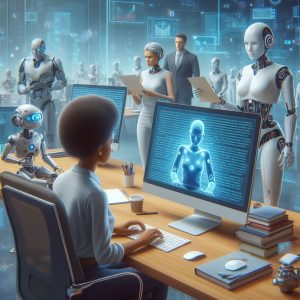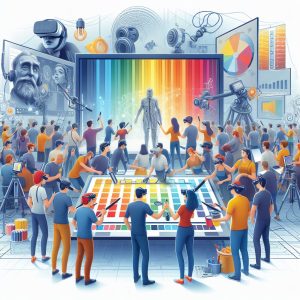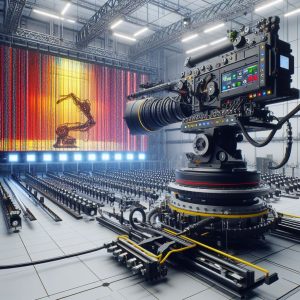The film industry is undergoing a transformative journey, fueled by the rapid advancements in artificial intelligence (AI). AI-driven storytelling techniques are revolutionizing the way directors craft immersive cinematic experiences, pushing the boundaries of traditional filmmaking.
1. AI-Powered Scriptwriting:
- AI algorithms are employed to analyze vast amounts of data, including scripts, audience feedback, and market trends. This analysis helps directors identify story elements that resonate with audiences, creating highly engaging and relatable narratives.
2. Enhanced Cinematography:
- AI-powered software assists directors in selecting camera angles, framing, and lighting techniques. By analyzing visual data, AI helps create visually stunning and emotionally impactful scenes that captivate viewers.
3. Personalized Viewer Experience:
- AI algorithms track viewer engagement and preferences. Based on this data, AI can generate personalized recommendations for viewers, tailoring the content to their specific tastes and interests.
4. Interactive Storytelling:
- AI facilitates the creation of interactive storytelling experiences, where viewers can influence the narrative through their choices. This innovative approach allows for a more immersive and captivating viewing experience.
5. Emotion Recognition:
- AI-powered facial recognition technology can analyze viewers’ emotional responses to scenes, allowing directors to fine-tune their storytelling approach. This data-driven analysis ensures that films effectively evoke the intended emotions.
6. Immersive Technologies:
- AI plays a crucial role in developing virtual and augmented reality experiences within films. These technologies blend the physical and digital worlds, creating immersive cinematic environments that transport viewers into the story.
As AI continues to advance, directors have access to a wealth of new tools and techniques that empower them to create groundbreaking cinematic experiences. AI-driven storytelling enables directors to craft highly personalized, emotionally engaging, and visually stunning films that resonate with audiences on a deeper level. As technology evolves, the future of filmmaking promises even more immersive and transformative storytelling possibilities.
The rapid advancement of Artificial Intelligence (AI) is transforming various industries, and the film industry is no exception. While AI brings about immense possibilities for enhancing storytelling, it also raises questions about the potential impact on the role of directors in cinema. In this blog, we delve into the dangers posed by AI to the director’s job, explore the likelihood of AI replacing directors, analyze how AI can assist directors in their work, and provide strategies for adapting to the changing landscape.

Dangers of AI to the Director’s Job:
- Automation:
AI-powered tools can automate many tasks currently performed by directors, such as editing, color correction, and even generating entire scenes. This automation could potentially lead to a decrease in the demand for directors.
- Reduced Creative Control:
AI algorithms may limit directors’ creative freedom by imposing certain aesthetic choices or narrative structures. This could result in homogenized, less diverse films that lack the personal touch of a human director.
- Loss of Employment Opportunities:
If AI systems become capable of directing films independently, the demand for human directors could decline, leading to unemployment and underemployment in the industry.
Possibilities of AI Replacing Directors:
- Limited Creative Capabilities:
Despite advancements, AI systems currently lack the capacity for abstract thinking, emotional intelligence, and cultural understanding that are essential for creating compelling and meaningful films. Human directors bring a unique perspective and experience that AI cannot replicate.
- Narrative and Emotional Complexity:
AI systems struggle to handle complex narratives and convey emotions effectively. Human directors excel in this area, using their artistic vision to create emotionally resonant stories that connect with audiences.
- Industry Resistance:
The film industry is deeply rooted in tradition and artistic expression. There is likely to be resistance from filmmakers, critics, and audiences to accept AI-generated films as legitimate cinematic works.
How AI Can Assist Directors:
- Enhanced Pre-Production:
AI can be used to analyze scripts, identify potential plot holes, and generate alternative story structures. This can help directors refine their ideas and make informed decisions during the pre-production phase.
- Visual Effects and Animation:
AI can be instrumental in creating realistic visual effects and animations, enabling directors to bring their creative visions to life. This can greatly enhance the overall visual appeal and impact of a film.
- Audience Insights and Data Analysis:
AI-driven analytics can provide directors with valuable insights into audience preferences, trends, and demographics. This information can guide directors in making informed decisions about film content, marketing strategies, and distribution channels.
- Script Optimization and Dialogue Generation:
AI can analyze existing scripts and dialogue to identify areas for improvement. It can also generate suggestions for alternative dialogue options, helping directors refine and enhance their storytelling.
Adapting to the Changing Landscape:
- Embrace Collaborative Creativity:
Directors should view AI as a collaborative tool rather than a threat. By embracing AI’s capabilities and incorporating them into their creative process, directors can unlock new possibilities and enhance their storytelling abilities.
- Develop Digital Skills:
Directors should invest time in developing digital skills and learning about AI technology. This knowledge will enable them to harness AI’s potential effectively and stay relevant in the evolving landscape.
- Stay Adaptable and Innovative:
The film industry is constantly evolving, and directors need to be adaptable and innovative to thrive. Embracing change, experimenting with new technologies, and seeking opportunities to collaborate with AI can help directors stay ahead of the curve.
Conclusion:
While AI poses potential risks to the director’s role in cinema, it also presents immense opportunities for enhancing storytelling capabilities and revolutionizing the filmmaking process. By understanding the dangers and possibilities of AI, directors can adapt to the changing landscape, embrace collaborative creativity, develop digital skills, and stay adaptable. In doing so, they can continue to play a vital role in shaping the future of cinema and creating impactful and memorable films for audiences worldwide.



